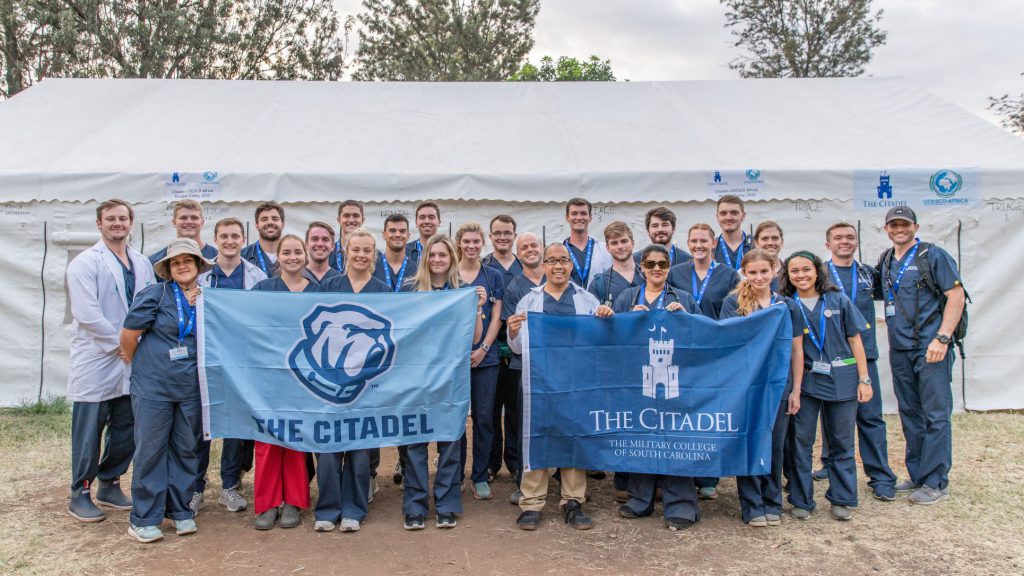
Photos courtesy of Ryan Kasyan
A month in Kenya providing medical services to the underprivileged in Kenya during the summer of 2021 was so inspiring to Sarah Imam, M.D., a Health and Human Performance professor at The Citadel, that she wanted to offer the same experience to her students. With the help of Mr. and Mrs. David C. Swain Jr., ’80, and Dr. and Mrs. Christopher C. Swain, ’81, she did just that.
In June, Imam and her colleague Professor Kimbo Yee traveled with 23 cadets and students to Nairobi. For three weeks, the group operated a medical clinic with free services in Mathare, a slum in Nairobi where the average life expectancy is 30 years.
The Citadel group performed ECGs and ultrasounds, administered vaccines, dressed wounds, tested vision and even treated a case of elephantiasis. All of their work fell under the Association of American Medical Colleges guidelines, and the students did not participate in any medical procedures.
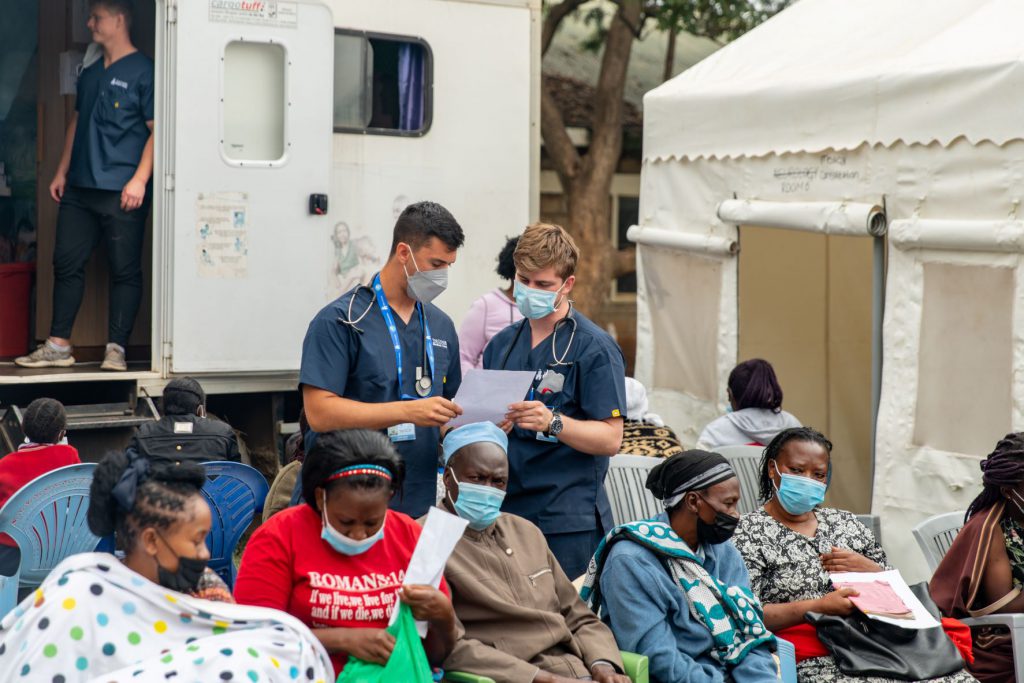
“Nairobi slum residents have a high mortality burden from preventable and treatable conditions,” said Imam.
When the Swains — who together founded OB Hospitalist Group, the largest and only dedicated OB/GYN hospitalist employer in the nation — learned of Imam’s plans to offer a medical service-learning program in Africa, they immediately volunteered to fund the project.
“As a physician and a human, it’s useful to have a good understanding of what poverty is, what hardship is and how it feels to give back and make a difference,” said Chris Swain. “You can’t really teach empathy, but you can pick it up through a hands-on, immersive experience like this.”
When they were not in clinic, the students toured Kenya, taking in a giraffe center, visiting an elephant orphanage and going on a boat safari.
Stay tuned: Additional travelogues by veteran student Ben Knight will appear in The Citadel magazine in October.
Jambo from Nairobi
Cadet Camille Simmons, a senior exercise science major from Tallahassee, Florida, was one of 23 students who participated in The Citadel’s three-week summer service-learning program in Africa.
Nairobi introduces herself with traffic, on the wrong side of a winding highway with the smell of exhaust blowing through an open window, and – goats. Yes, goats, bleating cluelessly on a sidewalk. After the highway splits off, colorful artwork in the form of clotheslines swamps the rundown apartment complexes. People selling fruits, meats, socks, shoes and jewelry shout at pedestrians in smooth Swahili as our bus pulls into the medical camp. This morning, the faint smell of smoked meat greets us all, along with a hint of cigars.
“Is that barbeque?” Heidi, my roommate, asks.
“Jambo!” a UCESCO worker shouts as we hop off the bus. We’re all greeted with the biggest, most joyful smiles.
“Jambo, Jambo!” we all shout in unison. This was the first word our group collectively learned, the Swahili word for “hello.”
The camp bustles with sick children, people eager to see a dentist and patients who need insulin. And each one returns the only greeting I know with a smile. Their inherent happiness is contagious, even among sickness and injury. It’s the one contagion we all hope to acquire.
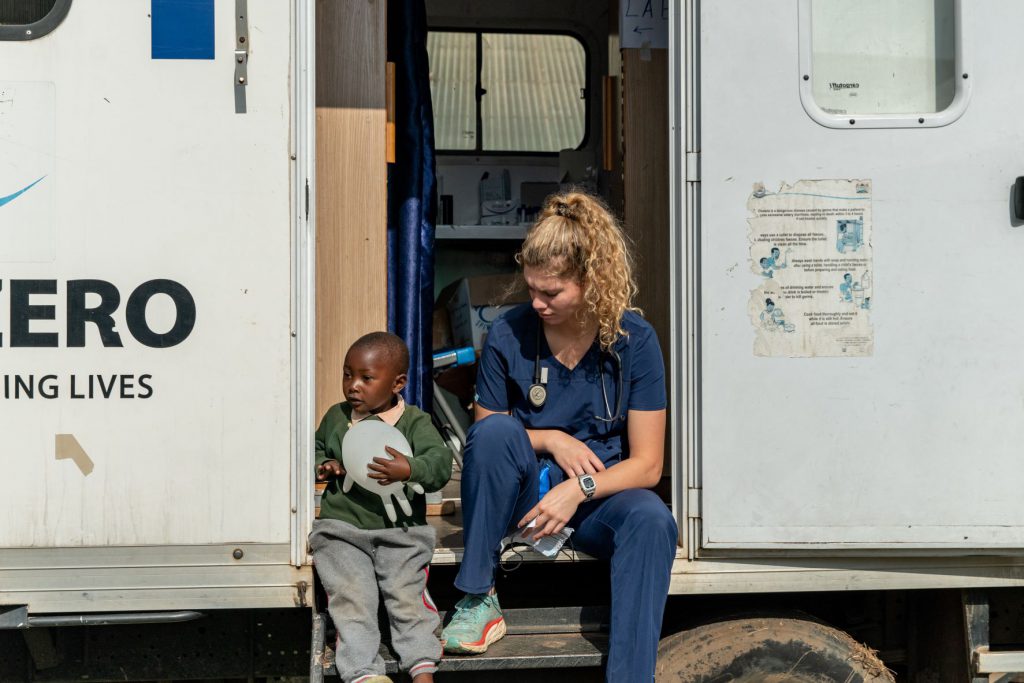
“It’s going to be okay,” I assure an older man with a badly broken arm. I know that he can’t understand a word I say, but as he looks into my eyes and sees my smile, his face relaxes. In the first day, I learned that language barriers do not inhibit you from giving the gifts of hope and comfort. The universal language is found in our tones and expressions.
The man returns later with a copy of his x-ray, and we raise 10,000 Kenyan shillings to help him afford a cast that will save his arm.
“Where are you from?,” a sweet Kenyan school girl asks me in perfect English.
“America!” I tell her excitedly. Her face lights up, and with a smile plastered across her lips, she introduces me to the rest of her school friends.
“Do you like spaghetti?”
“Do you know Barack Obama?”
“Do you watch football?”
I am overwhelmed by the interest and excitement these school children display. Their smiles and laughter overtake the bustling sounds of the slums outside of camp. My hair becomes a novelty, its texture and color unbeknownst to the children.
“Do you have any questions about America?” I ask our interpreter, Jeremy, who is studying psychology and hopes to be a counselor.
“Uhh… what is your economy like?” he asks. After I explain the basics of the American economy, which I still do not fully understand, he and his coworker, Linda, review the dynamics of the Kenyan economy.
I spend the rest of my day shadowing Dr. Imam as she assists patients of all ages with all sorts of medical issues. Pneumonia, ulcers, asthma, scabies, high blood pressure and even severe anxiety—issues that are not as emergent in America, issues that are generally resolvable in a day, but here, in the slums of Nairobi, they become life threatening.
Throughout the day, our group zips from tent to tent, records vitals, shadows physicians, greets hundreds of patients and enjoys a nice break in the winter sun, which, if you don’t know, is unbearably hot. However, this does not seem to faze the child performers who conduct beautiful traditional dances as a gesture of thanks. Colorful costumes, full smiles and booming drums bring our first day of medical camp to a close.
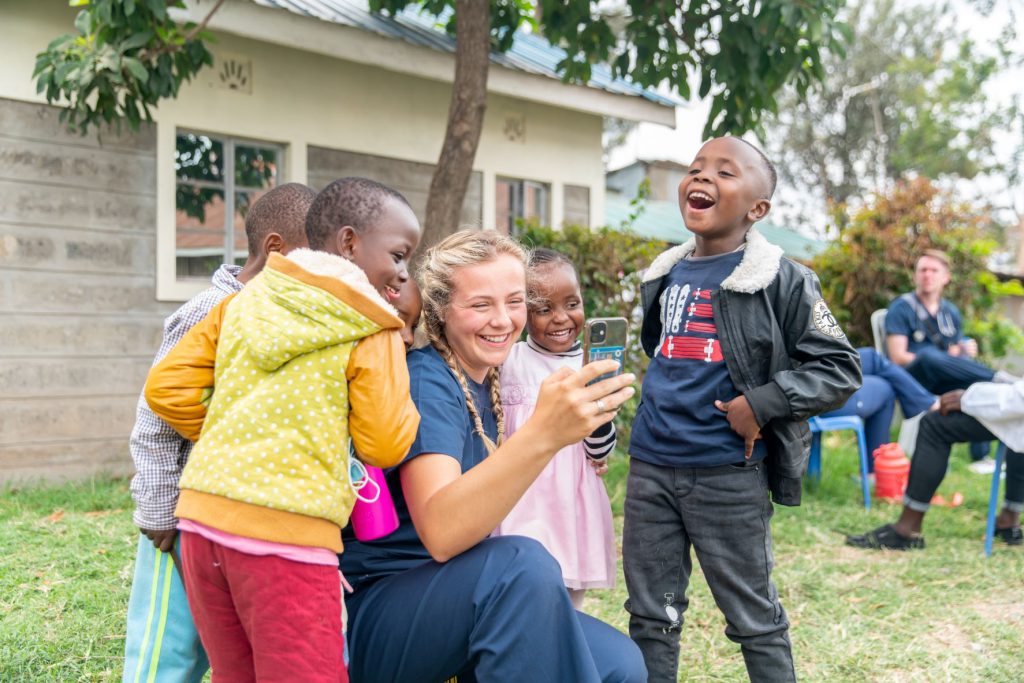

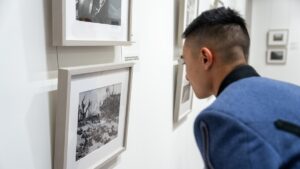 Moore Art Gallery opens “All Hands on Deck” WWII naval photography exhibit
Moore Art Gallery opens “All Hands on Deck” WWII naval photography exhibit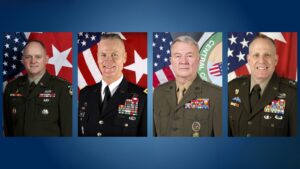 The Citadel’s presidential search committee announces four finalists
The Citadel’s presidential search committee announces four finalists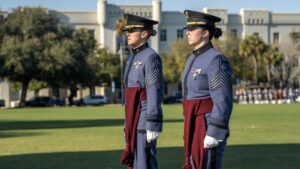 Prestigious Cincinnati and MacArthur awards presented to Citadel cadets
Prestigious Cincinnati and MacArthur awards presented to Citadel cadets


